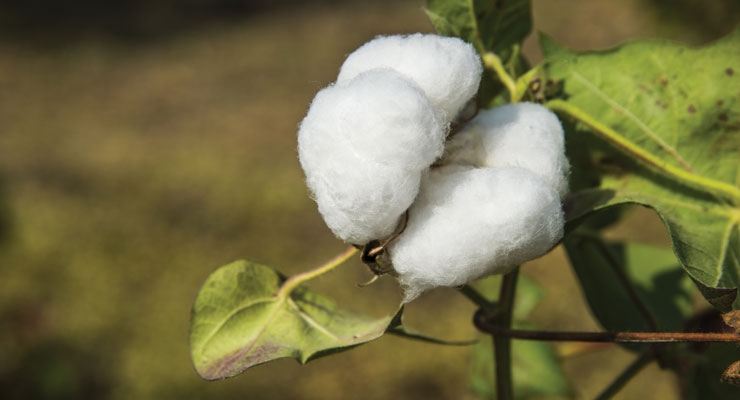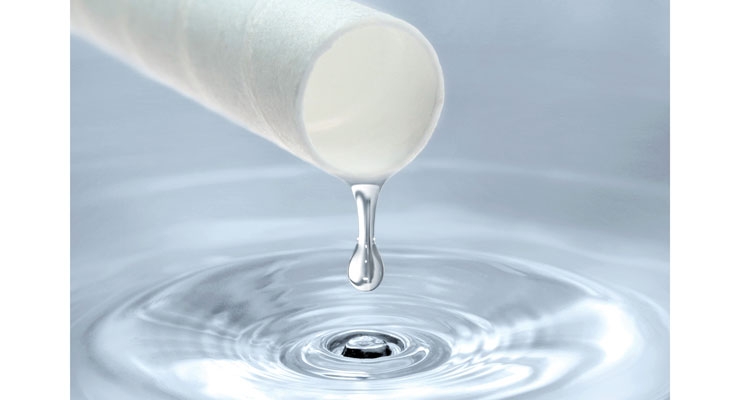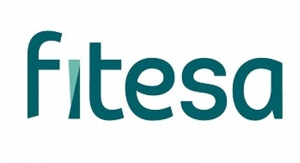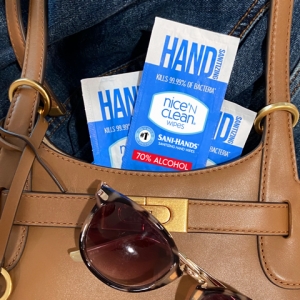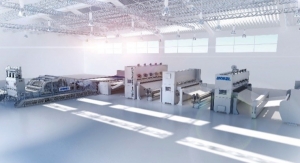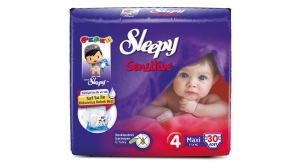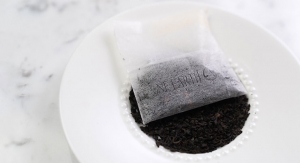Tara Olivo, Associate Editor05.31.17
Fiber developers and manufacturers continue to refine their offerings in response to consumer demands. One example of this is creating softer, more absorbent products for applications in the hygiene market. In another instance, fiber makers are also responding to increased environmental awareness. Whether it’s a biodegradable source like cellulose, or a recyclable option such as polyester, nonwovens producers are marketing the environmental sustainability of their products.
Cotton is known to offer a positive sustainability profile—it is considered a natural fiber, it’s biodegradable and it’s drought-tolerant. While T-shirts, jeans and towels traditionally come to mind when consumers think of cotton, the fiber continues to grow its presence in the nonwovens industry. Increased usage of this fiber is being seen in applications like diapers, feminine hygiene products and wipes as consumers become more aware of and scrutinize ingredients used in personal care products.
“The demand for more products that are healthier for skin has been a perfect match with cotton’s natural hypoallergenic properties,” says Jan O’Regan, director, Strategic Initiatives, Cotton Incorporated. “Given that there are no regulations around revealing fiber content in hygiene and wipes products, simply telling consumers on the package that there is cotton in the product, stimulates interest in purchasing.”
The ever-increasing expertise and technical development in producing nonwovens using natural cotton, which O’Regan notes is shorter than most carded fibers and longer than most airlaid fibers, is also contributing to cotton’s growth in the market.
And, sustainability is a key driver of cotton’s expansion into more nonwoven-based products. In addition to the aforementioned environmentally friendly characteristics, O’Regan points out that as a crop, cotton provides food in addition to fiber and satisfies the 60% of the world’s demand for textile fiber on 3% of the world’s agricultural land.
Cotton’s Players
Ihsan Sons (Pvt) Ltd., a manufacturer and exporter of cotton waste and bleached absorbent cotton, yarns and nonwoven fabrics, is the flagship company of the industrial group Ihsan Pakistan. The group entered the textile business in 1947 and after supplying the local market, the family which has been in business since 1939, expanded to meet export orders in 1956 with its first facility processing cotton waste.
In the early 1990s, the group set up its own in-house fiber processing and cleaning facilities along with a bleaching plant in Lahore, Pakistan. In 2006, Ihsan Sons began producing cotton spunlace fabrics, fully equipped with technology from Fleissner, as well as Trützschler and Spinnbau.
With an annual capacity of around 12,000 tons of bleached absorbent cotton, Ihsan Sons handles in-house processing from the raw fibers to producing 100% cotton nonwoven fabrics, which are sold under the brand name Belcot. Mahmood J. Ihsan, CEO, says the equipment is able to make fabrics weighing from 30-70 gsm in widths of up to two meters. The annual capacity of its spunlace line is about 3000 tons.
Ihsan Sons recently upgraded its auto sorting systems to produce some of the cleanest bleached cotton and spunlace fabrics available, and to protect the environment, the company has installed a heat recovery system, producing steam from the waste heat and hot water from its captive power plant.
Ihsan has also been busy developing new products, introducing light weight cotton spunlace nonwoven fabric in 20-25 gsm, highly suitable for hygienic products, including its new brand Femcot, a hydrophobic fabric that’s ideal for backsheets in diapers and femcare. Mahmood says an aperture version of Femcot is also available for keeping topsheets dry while allowing the liquid through to the ADL. The company has also diversified into manufacturing cotton dry wipes, kitchen rolls, soft cloths, baby wipes and pocket packs.
Ihsan Sons has also begun processing organic cotton, a more sustainable form of agriculture in comparison to conventional cotton as it reduces fertilizer pesticide use, in addition to using scarce water more efficiently. Its 100% GOTS certified organic cotton nonwoven fabrics are labeled under the brand name Organicot, and are available in plain, aperture and structured/embossed constructions meeting all international health standards set by WSP, EDANA, BPC and ISO. “Organic cotton used for the making of nonwoven fabric is natural, hypoallergenic, renewable and a biodegradable fiber which benefits cotton producers and the environment in the developing countries by avoiding the harmful effects of toxic pesticides, improves social conditions also more beneficial for feminine healthcare,” Mahmood says.
Also focusing on organic cotton is Barnhardt Manufacturing, a 117-year-old, privately held company that has been purifying cotton for nearly a century. The company responded to market demands when it developed newly launched organic Purified Cotton products for hygiene applications—Organic High Q Ultra and Organic HyDri Ultra.
“Given that organic cotton defoliates naturally resulting in high visual foreign matter, Barnhardt has developed a process to more effectively remove the higher VFM typically found in the organic cotton making it more suitable for the clean, white surface consumers look for in their hygiene products,” explains George Hargrove, vice president, sales and marketing at Barnhardt Manufacturing.
Both ultra-clean and made of pure organic cotton, Organic High Q Ultra is hydrophilic and is suitable for discerning consumers of hygienic products where absorbency is important, while Organic HyDri Ultra is hydrophobic and is suitable for hygienic products such as topsheets.
“These two products were developed to meet consumer’s requirements for clean and pure fiber with minimal remaining leaf or natural cotton plant matter,” Hargrove says.
Consumers continue indicate preferences for natural fiber products, and this is helping cotton’s share in the market grow.
“What began in Asia as a recognition by female consumers for cotton next to their skin in feminine hygiene products has now become a global preference,” he says. “The manufacturers of all hygiene products—feminine, baby and adult care—are responding to increased consumer response and awareness as to what is in these products. For the most part, consumers have thought that these products were made from cotton, not realizing that they were primarily made from synthetics. Recent success from products that are made from 100% cotton across the globe has driven awareness in consumer demand throughout the supply chain.”
Meanwhile, cotton grower TJ Beall has been promoting its new line of True Cotton white unbleached cotton fibers for carded applications—it’s currently being used in needlepunched bedding and mattress applications as well as in hygiene products in the U.S. and Asia.
“We are able to make natural colored cotton fibers appear much whiter through innovations we have developed with the USDA and, most importantly, still without the use of water or chemical treatments in our process,” says Lawson Gary, COO, TJ Beall Company.
Cotton’s softness, marketing attributes, sustainability profile, and the availability of natural fibers for the industry which process and perform as efficiently as manmade fibers are just some of the reasons natural fibers like cotton are experiencing growth in the nonwovens industry, Gary says.
“We think that there is soon to be many new cotton-containing hygiene components available, and we think that the current interest in cotton is coming now from mainstream players,” he says.
Synthetic Offerings Grow
Synthetic, oil-based fibers have played major roles in the nonwovens industry for decades. Polypropylene is significantly used in the hygiene market, where it’s the preferred choice in many diapers, feminine hygiene and adult incontinence products. On the other hand, polyester finds itself in many industrial areas including automotive applications, construction and roofing materials, as well as bedding, and it is finding its way into more wipes products.
ES FiberVisions, a joint venture between FiberVisions (USA)—a manufacturer of polyolefin staple fibers—and JNC (Japan), supplies synthetic bicomponent fibers to the nonwovens industry.
Recently, ES FiberVisions has developed next generation bicomponent staple fibers for topsheet and cover stock applications. New Soft Bico is based on polypropylene/polyethylene bicomponents fibers containing new chemistries to provide built-in softness, durable hydrophilicity and wettability.
“Optimum fiber properties are achieved by combining the physical properties of the fiber with our advanced finish technology. This gives outstanding liquid acquisition performance in the nonwoven,” says Flemming Bynge, European sales and marketing manager, FiberVisions and ES FiberVisions.
At the same time, FiberVisions is offering new concepts addressing the segment of filtration applying new technology for performance enhancement.
The Intercept brand for air filtration was recently expanded to include its monocomponent polypropylene (PP) fibers for liquid filtration. PP is ideal for liquid filtration applications because of its broad chemical resistance, zero moisture regain and low specific gravity, according to the company. Intercept PP staple fibers can be converted into carded liquid filtration substrates including spun yarn, needlepunch, thermal bond and spunlace.
New filtration platforms from ES FiberVisions and FiberVisions include G8 Finish Chemistry, eccentric core bico fibers and trilobal shaped PP fibers. G8 Finish Chemistry is designed to boost mechanical filtration by increasing impaction and interception. Potential benefits include basis weight reduction or entering a higher value MERV or EN 779 category. Meanwhile, its bicomponent fibers with eccentric core placement provides increased loft and void volume in the filter media. Finally, monocomponent PP fibers with a trilobal cross section can be used to introduce alternative fiber geometries in filter media. Fine denier trilobal PP fibers increase total surface area for higher particle capture. The increased void fraction also helps to minimize air resistance. The high PP content helps improve electrostatic particle capture in a charged media.
Another major player in the synthetics market is polyester fiber producer Trevira, which continues to support its customers by developing tailor-made products.
According to Hartmann Huth, Trevira’s vice president of Business Unit Fibers, many markets in the nonwovens industry show growth potential for fibers including filtration, hygiene and sustainable/green products.
The need for filtration materials is driven by improving infrastructures in emerging markets, while the global social developments and an increasing middle class in these countries result in a growing demand for products like wet wipes and baby diapers.
On the sustainability side, while most of raw materials used for Trevira’s fibers are made from oil derivatives, Huth says the company’s objective is to manufacture its polyester products as environmentally friendly as possible in terms of conserving resources, saving energy, etc. “With improved products we help our customers optimize further processing of our fibers in the value chain,” he says. “However, one focus in our product development is to expand our range of fibers made from biopolymers.”
Huth adds that the task for them as a manufacturer of the base materials isn’t just to make just fibers but to make fiber products that serve the requirements of the product throughout the entire value chain up to its end use. “Composites with reduced weight for use in modern lightweight electro cars might serve as an example here. New materials aim at waste reduction, recyclability and energy saving potential. We see a bunch of new composites and multilayer materials where modern man-made fibers play a vital role,” he says.
Meanwhile, DAK Americas, another producer of polyester staple fibers, is innovating for the wipes market. “We are seeing continued and consistent growth in the household and personal care wipes market using both spunlace and spunmelt technology,” says company vice president Mark Ruday. “This growth is primarily related to consumer preference and ease of use.”
DAK has recently launched two new commercial products in this market. The first is a different cross-section design, which allows for improved cover at a lower basis weight in wipe applications. The other is an improved moisture management design for spunlace wipes. Ruday says these products are being marketed as consumer brands with DAK fiber as the special ingredient in the consumer brand, rather than a fiber trade brand.
DAK Americas has also seen a significant increase in interested for special features for its fibers. These include anti-microbial, moisture management, and other sustainable type fibers including recycled content. “Our customers are also requesting enhanced product performance criteria and basis weight reductions which we can achieve through different cross-sections, deniers, and other proprietary additives/finishes,” Ruday says.
Sustainability is Front and Center
Matthew North, commercial director of German viscose fiber producer Kelheim Fibres, is seeing significant growth in demand for short cut fibers for the manufacture of dispersible substrates, which are used for flushable wipes.
“The market for these products—principally used for the manufacture of moist toilet tissue – is becoming established, and the proven performance of Kelheim’s fibers in this area, both in terms of processing and dispersability performance are key growth drivers,” he says.
Manufactured from cellulose, Kelheim’s fibers are derived from sustainably managed plantations, and can be supplied with Forest Stewardship Council (FSC) or (Programme for the Endorsement of Forest Certification) PEFC certification.
With consumers becoming increasingly aware of the impact of their behavior and the products they use on the environment, sustainability is top of mind for Kelheim and others in the industry, especially in the disposables market.
“The sustainable raw materials used in the production of viscose—cellulose from managed forests—and the knowledge that the products can be disposed of safely and without harm to the environment are key drivers for growth,” North explains. “Beyond this the inherent properties of viscose, particularly in terms of its absorbency, ensures that products made from viscose fibers deliver consistent high performance for the consumer.”
In the U.S., Leigh Fibers recycles waste materials that are sources from the apparel, bedding, nonwovens, home furnishings, filtration and automotive industries, both natural and synthetic fibers that can be reprocessed and reused in the nonwovens industry. Leigh’s fiber products add can be found in acoustical insulation, furniture padding, geotextiles, bedding and other applications. “[Our fibers give] the industry a sustainable fiber and raw material option, economic benefit versus traditionally used staple fiber, marketing benefit of the nonwovens containing recycled content,” says Daniel Mason, senior vice president of Business Development, Leigh Fibers.
Since its founding nearly a century ago, Leigh has diverted more than 14 billion pounds of textile waste and by-products from landfills and is currently active in 25 countries around the world.
In 2014, Leigh acquired ICE Recycling. The Lake City, SC-based company reprocesses post-industrial polymers, cardboard, paper and metals for companies throughout the Southeast and Mid-Atlantic. ICE provides both on-site waste-stream management as well as off-site reprocessing services. “The acquisition of ICE Recycling has allowed Leigh Fibers to strengthen their raw material supply chain while adding to the suite of sustainable products and services they offer,” Mason says.
Fiber Companies Expand
European polyolefin fiber producer Beaulieu Fibres International (BFI) will be bringing more fiber innovations to address market demands in automotive, flooring and geotextiles, and the company recently announced a €15 million investment that will bring new fiber technology on an industrial scale in Belgium. The investment, which will be commissioned in November of this year, is part of an ongoing program to extend fiber production to meet future challenges and customer needs.
BFI is expanding its Meraklon portfolio with the launch of new polyester (PET) core bico fibers. These fibers will come on stream with Meraklon’s new state-of-the-art, long line at the company’s site in Terni, Italy. The €30 million investment to extend production capacity is currently underway and is scheduled to commence operations this year.
Other expansions to the Meraklon range include the addition of BFI’s Meralux fibers. First test results show that nonwovens made with the new Meralux fiber combinations have a higher loft/bulk. Meralux’s coverage is unique and provides nonwovens with a very closed surface, without containing additives like TiO2. With the higher loft and unique coverage, softness will be provided by the choice of raw materials. Further, Meralux allows basis weight reductions without losing performance.
BFI will also add short cut fibers for hygiene applications to its range this summer. These will be available in cut lengths of 3-24mm in polypropylene (PP) mono and bico.
Meanwhile, Lenzing, which produces cellulose-based fibers such as Tencel, has embarked on an ambitious investment program. Last summer, the Austrian company announced it would capitalize on growth of its specialty fibers and expand its capacity by 35,000 tons by mid 2018. About €70 million will be invested in Heiligenkreuz, Austria, and €30 million in Lenzing, Austria, taking place solely at existing Lenzing locations to facilitate a quick completion. The company had also previously announced an expansion at its Grimsby, U.K. Plant.
In December, the group announced that it would build a state-of-the-art Tencel fiber plant with a production capacity of 90,000 tons per year at its site in Mobile, AL. The new facility will be the largest Tencel fiber plant in the world, and the investment volume will total $293 million. The new plant is scheduled to start in the first quarter of 2019.
Lenzing currently has a worldwide production capacity of 222,000 tons per year of Tencel fibers.
“The market for wood-based cellulose fibers is growing approximately twice as fast as the market for textile and nonwovens fibers in general – including cotton and synthetic fibers,” says Waltraud Kaserer, vice president Corporate Communications & Investor Relations. “Against this background we have been noticing a rising demand for all Lenzing fibers. The new plant in Mobile plus the already announced debottlenecking projects at the other production sites for Tencel branded fibers will increase the total production capacities of Tencel fibers by more than 50% by 2019. The decision to build this plant in the U.S. was supported by the good infrastructure at our Mobile site and attractive energy costs.”
Cotton is known to offer a positive sustainability profile—it is considered a natural fiber, it’s biodegradable and it’s drought-tolerant. While T-shirts, jeans and towels traditionally come to mind when consumers think of cotton, the fiber continues to grow its presence in the nonwovens industry. Increased usage of this fiber is being seen in applications like diapers, feminine hygiene products and wipes as consumers become more aware of and scrutinize ingredients used in personal care products.
“The demand for more products that are healthier for skin has been a perfect match with cotton’s natural hypoallergenic properties,” says Jan O’Regan, director, Strategic Initiatives, Cotton Incorporated. “Given that there are no regulations around revealing fiber content in hygiene and wipes products, simply telling consumers on the package that there is cotton in the product, stimulates interest in purchasing.”
The ever-increasing expertise and technical development in producing nonwovens using natural cotton, which O’Regan notes is shorter than most carded fibers and longer than most airlaid fibers, is also contributing to cotton’s growth in the market.
And, sustainability is a key driver of cotton’s expansion into more nonwoven-based products. In addition to the aforementioned environmentally friendly characteristics, O’Regan points out that as a crop, cotton provides food in addition to fiber and satisfies the 60% of the world’s demand for textile fiber on 3% of the world’s agricultural land.
Cotton’s Players
Ihsan Sons (Pvt) Ltd., a manufacturer and exporter of cotton waste and bleached absorbent cotton, yarns and nonwoven fabrics, is the flagship company of the industrial group Ihsan Pakistan. The group entered the textile business in 1947 and after supplying the local market, the family which has been in business since 1939, expanded to meet export orders in 1956 with its first facility processing cotton waste.
In the early 1990s, the group set up its own in-house fiber processing and cleaning facilities along with a bleaching plant in Lahore, Pakistan. In 2006, Ihsan Sons began producing cotton spunlace fabrics, fully equipped with technology from Fleissner, as well as Trützschler and Spinnbau.
With an annual capacity of around 12,000 tons of bleached absorbent cotton, Ihsan Sons handles in-house processing from the raw fibers to producing 100% cotton nonwoven fabrics, which are sold under the brand name Belcot. Mahmood J. Ihsan, CEO, says the equipment is able to make fabrics weighing from 30-70 gsm in widths of up to two meters. The annual capacity of its spunlace line is about 3000 tons.
Ihsan Sons recently upgraded its auto sorting systems to produce some of the cleanest bleached cotton and spunlace fabrics available, and to protect the environment, the company has installed a heat recovery system, producing steam from the waste heat and hot water from its captive power plant.
Ihsan has also been busy developing new products, introducing light weight cotton spunlace nonwoven fabric in 20-25 gsm, highly suitable for hygienic products, including its new brand Femcot, a hydrophobic fabric that’s ideal for backsheets in diapers and femcare. Mahmood says an aperture version of Femcot is also available for keeping topsheets dry while allowing the liquid through to the ADL. The company has also diversified into manufacturing cotton dry wipes, kitchen rolls, soft cloths, baby wipes and pocket packs.
Ihsan Sons has also begun processing organic cotton, a more sustainable form of agriculture in comparison to conventional cotton as it reduces fertilizer pesticide use, in addition to using scarce water more efficiently. Its 100% GOTS certified organic cotton nonwoven fabrics are labeled under the brand name Organicot, and are available in plain, aperture and structured/embossed constructions meeting all international health standards set by WSP, EDANA, BPC and ISO. “Organic cotton used for the making of nonwoven fabric is natural, hypoallergenic, renewable and a biodegradable fiber which benefits cotton producers and the environment in the developing countries by avoiding the harmful effects of toxic pesticides, improves social conditions also more beneficial for feminine healthcare,” Mahmood says.
Also focusing on organic cotton is Barnhardt Manufacturing, a 117-year-old, privately held company that has been purifying cotton for nearly a century. The company responded to market demands when it developed newly launched organic Purified Cotton products for hygiene applications—Organic High Q Ultra and Organic HyDri Ultra.
“Given that organic cotton defoliates naturally resulting in high visual foreign matter, Barnhardt has developed a process to more effectively remove the higher VFM typically found in the organic cotton making it more suitable for the clean, white surface consumers look for in their hygiene products,” explains George Hargrove, vice president, sales and marketing at Barnhardt Manufacturing.
Both ultra-clean and made of pure organic cotton, Organic High Q Ultra is hydrophilic and is suitable for discerning consumers of hygienic products where absorbency is important, while Organic HyDri Ultra is hydrophobic and is suitable for hygienic products such as topsheets.
“These two products were developed to meet consumer’s requirements for clean and pure fiber with minimal remaining leaf or natural cotton plant matter,” Hargrove says.
Consumers continue indicate preferences for natural fiber products, and this is helping cotton’s share in the market grow.
“What began in Asia as a recognition by female consumers for cotton next to their skin in feminine hygiene products has now become a global preference,” he says. “The manufacturers of all hygiene products—feminine, baby and adult care—are responding to increased consumer response and awareness as to what is in these products. For the most part, consumers have thought that these products were made from cotton, not realizing that they were primarily made from synthetics. Recent success from products that are made from 100% cotton across the globe has driven awareness in consumer demand throughout the supply chain.”
Meanwhile, cotton grower TJ Beall has been promoting its new line of True Cotton white unbleached cotton fibers for carded applications—it’s currently being used in needlepunched bedding and mattress applications as well as in hygiene products in the U.S. and Asia.
“We are able to make natural colored cotton fibers appear much whiter through innovations we have developed with the USDA and, most importantly, still without the use of water or chemical treatments in our process,” says Lawson Gary, COO, TJ Beall Company.
Cotton’s softness, marketing attributes, sustainability profile, and the availability of natural fibers for the industry which process and perform as efficiently as manmade fibers are just some of the reasons natural fibers like cotton are experiencing growth in the nonwovens industry, Gary says.
“We think that there is soon to be many new cotton-containing hygiene components available, and we think that the current interest in cotton is coming now from mainstream players,” he says.
Synthetic Offerings Grow
Synthetic, oil-based fibers have played major roles in the nonwovens industry for decades. Polypropylene is significantly used in the hygiene market, where it’s the preferred choice in many diapers, feminine hygiene and adult incontinence products. On the other hand, polyester finds itself in many industrial areas including automotive applications, construction and roofing materials, as well as bedding, and it is finding its way into more wipes products.
ES FiberVisions, a joint venture between FiberVisions (USA)—a manufacturer of polyolefin staple fibers—and JNC (Japan), supplies synthetic bicomponent fibers to the nonwovens industry.
Recently, ES FiberVisions has developed next generation bicomponent staple fibers for topsheet and cover stock applications. New Soft Bico is based on polypropylene/polyethylene bicomponents fibers containing new chemistries to provide built-in softness, durable hydrophilicity and wettability.
“Optimum fiber properties are achieved by combining the physical properties of the fiber with our advanced finish technology. This gives outstanding liquid acquisition performance in the nonwoven,” says Flemming Bynge, European sales and marketing manager, FiberVisions and ES FiberVisions.
At the same time, FiberVisions is offering new concepts addressing the segment of filtration applying new technology for performance enhancement.
The Intercept brand for air filtration was recently expanded to include its monocomponent polypropylene (PP) fibers for liquid filtration. PP is ideal for liquid filtration applications because of its broad chemical resistance, zero moisture regain and low specific gravity, according to the company. Intercept PP staple fibers can be converted into carded liquid filtration substrates including spun yarn, needlepunch, thermal bond and spunlace.
New filtration platforms from ES FiberVisions and FiberVisions include G8 Finish Chemistry, eccentric core bico fibers and trilobal shaped PP fibers. G8 Finish Chemistry is designed to boost mechanical filtration by increasing impaction and interception. Potential benefits include basis weight reduction or entering a higher value MERV or EN 779 category. Meanwhile, its bicomponent fibers with eccentric core placement provides increased loft and void volume in the filter media. Finally, monocomponent PP fibers with a trilobal cross section can be used to introduce alternative fiber geometries in filter media. Fine denier trilobal PP fibers increase total surface area for higher particle capture. The increased void fraction also helps to minimize air resistance. The high PP content helps improve electrostatic particle capture in a charged media.
Another major player in the synthetics market is polyester fiber producer Trevira, which continues to support its customers by developing tailor-made products.
According to Hartmann Huth, Trevira’s vice president of Business Unit Fibers, many markets in the nonwovens industry show growth potential for fibers including filtration, hygiene and sustainable/green products.
The need for filtration materials is driven by improving infrastructures in emerging markets, while the global social developments and an increasing middle class in these countries result in a growing demand for products like wet wipes and baby diapers.
On the sustainability side, while most of raw materials used for Trevira’s fibers are made from oil derivatives, Huth says the company’s objective is to manufacture its polyester products as environmentally friendly as possible in terms of conserving resources, saving energy, etc. “With improved products we help our customers optimize further processing of our fibers in the value chain,” he says. “However, one focus in our product development is to expand our range of fibers made from biopolymers.”
Huth adds that the task for them as a manufacturer of the base materials isn’t just to make just fibers but to make fiber products that serve the requirements of the product throughout the entire value chain up to its end use. “Composites with reduced weight for use in modern lightweight electro cars might serve as an example here. New materials aim at waste reduction, recyclability and energy saving potential. We see a bunch of new composites and multilayer materials where modern man-made fibers play a vital role,” he says.
Meanwhile, DAK Americas, another producer of polyester staple fibers, is innovating for the wipes market. “We are seeing continued and consistent growth in the household and personal care wipes market using both spunlace and spunmelt technology,” says company vice president Mark Ruday. “This growth is primarily related to consumer preference and ease of use.”
DAK has recently launched two new commercial products in this market. The first is a different cross-section design, which allows for improved cover at a lower basis weight in wipe applications. The other is an improved moisture management design for spunlace wipes. Ruday says these products are being marketed as consumer brands with DAK fiber as the special ingredient in the consumer brand, rather than a fiber trade brand.
DAK Americas has also seen a significant increase in interested for special features for its fibers. These include anti-microbial, moisture management, and other sustainable type fibers including recycled content. “Our customers are also requesting enhanced product performance criteria and basis weight reductions which we can achieve through different cross-sections, deniers, and other proprietary additives/finishes,” Ruday says.
Sustainability is Front and Center
Matthew North, commercial director of German viscose fiber producer Kelheim Fibres, is seeing significant growth in demand for short cut fibers for the manufacture of dispersible substrates, which are used for flushable wipes.
“The market for these products—principally used for the manufacture of moist toilet tissue – is becoming established, and the proven performance of Kelheim’s fibers in this area, both in terms of processing and dispersability performance are key growth drivers,” he says.
Manufactured from cellulose, Kelheim’s fibers are derived from sustainably managed plantations, and can be supplied with Forest Stewardship Council (FSC) or (Programme for the Endorsement of Forest Certification) PEFC certification.
With consumers becoming increasingly aware of the impact of their behavior and the products they use on the environment, sustainability is top of mind for Kelheim and others in the industry, especially in the disposables market.
“The sustainable raw materials used in the production of viscose—cellulose from managed forests—and the knowledge that the products can be disposed of safely and without harm to the environment are key drivers for growth,” North explains. “Beyond this the inherent properties of viscose, particularly in terms of its absorbency, ensures that products made from viscose fibers deliver consistent high performance for the consumer.”
In the U.S., Leigh Fibers recycles waste materials that are sources from the apparel, bedding, nonwovens, home furnishings, filtration and automotive industries, both natural and synthetic fibers that can be reprocessed and reused in the nonwovens industry. Leigh’s fiber products add can be found in acoustical insulation, furniture padding, geotextiles, bedding and other applications. “[Our fibers give] the industry a sustainable fiber and raw material option, economic benefit versus traditionally used staple fiber, marketing benefit of the nonwovens containing recycled content,” says Daniel Mason, senior vice president of Business Development, Leigh Fibers.
Since its founding nearly a century ago, Leigh has diverted more than 14 billion pounds of textile waste and by-products from landfills and is currently active in 25 countries around the world.
In 2014, Leigh acquired ICE Recycling. The Lake City, SC-based company reprocesses post-industrial polymers, cardboard, paper and metals for companies throughout the Southeast and Mid-Atlantic. ICE provides both on-site waste-stream management as well as off-site reprocessing services. “The acquisition of ICE Recycling has allowed Leigh Fibers to strengthen their raw material supply chain while adding to the suite of sustainable products and services they offer,” Mason says.
Fiber Companies Expand
European polyolefin fiber producer Beaulieu Fibres International (BFI) will be bringing more fiber innovations to address market demands in automotive, flooring and geotextiles, and the company recently announced a €15 million investment that will bring new fiber technology on an industrial scale in Belgium. The investment, which will be commissioned in November of this year, is part of an ongoing program to extend fiber production to meet future challenges and customer needs.
BFI is expanding its Meraklon portfolio with the launch of new polyester (PET) core bico fibers. These fibers will come on stream with Meraklon’s new state-of-the-art, long line at the company’s site in Terni, Italy. The €30 million investment to extend production capacity is currently underway and is scheduled to commence operations this year.
Other expansions to the Meraklon range include the addition of BFI’s Meralux fibers. First test results show that nonwovens made with the new Meralux fiber combinations have a higher loft/bulk. Meralux’s coverage is unique and provides nonwovens with a very closed surface, without containing additives like TiO2. With the higher loft and unique coverage, softness will be provided by the choice of raw materials. Further, Meralux allows basis weight reductions without losing performance.
BFI will also add short cut fibers for hygiene applications to its range this summer. These will be available in cut lengths of 3-24mm in polypropylene (PP) mono and bico.
Meanwhile, Lenzing, which produces cellulose-based fibers such as Tencel, has embarked on an ambitious investment program. Last summer, the Austrian company announced it would capitalize on growth of its specialty fibers and expand its capacity by 35,000 tons by mid 2018. About €70 million will be invested in Heiligenkreuz, Austria, and €30 million in Lenzing, Austria, taking place solely at existing Lenzing locations to facilitate a quick completion. The company had also previously announced an expansion at its Grimsby, U.K. Plant.
In December, the group announced that it would build a state-of-the-art Tencel fiber plant with a production capacity of 90,000 tons per year at its site in Mobile, AL. The new facility will be the largest Tencel fiber plant in the world, and the investment volume will total $293 million. The new plant is scheduled to start in the first quarter of 2019.
Lenzing currently has a worldwide production capacity of 222,000 tons per year of Tencel fibers.
“The market for wood-based cellulose fibers is growing approximately twice as fast as the market for textile and nonwovens fibers in general – including cotton and synthetic fibers,” says Waltraud Kaserer, vice president Corporate Communications & Investor Relations. “Against this background we have been noticing a rising demand for all Lenzing fibers. The new plant in Mobile plus the already announced debottlenecking projects at the other production sites for Tencel branded fibers will increase the total production capacities of Tencel fibers by more than 50% by 2019. The decision to build this plant in the U.S. was supported by the good infrastructure at our Mobile site and attractive energy costs.”

